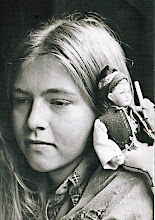As I peruse The Gasoline Automobile, published in 1915, it's clear that things could have taken a different direction. The book starts out by discussing the differences and pros and cons of steam propelled cars, electric cars, and gasoline automobiles. And though the book doesn't mention it, Henry Ford was also looking at the value of biofuels at that time. You have to wonder how different the world would be today if we had chosen a different fuel.
Would my mother have gone on this trip to the American Southwest in the early 60s in a steam-powered car? Maybe not. And the car may not have looked as sexy either.
I'm not a car buff, but I love reading through this book, because it explains the workings of the automobile in a way that's understandable to me. It helps that there aren't any electronics. The illustrations are also wonderful. It's interesting to think that the scarcity of second-growth hickory affected the choice of wheel design.
Motor on over to Sepia Saturday to read more about automobiles and the people transported by them.
By the way, if you want this book, you may be able to find original copies through Alibris or eBay. You can also order a reprint. And, if you want to read it on your computer, you can download it from the Internet Archive for free, courtesy of the California Digital Library.
Friday, November 18, 2011
Thursday, November 17, 2011
Greetings from the Seaside
The card and the message are not particularly well matched, but I think that's part of the appeal. The front of the card shows a very British or European looking beach scene.
The front and the back of the card both evoke the joys of summer; they just do it a little differently. Here's the back.
The card was sent to Gilbert Grinley of Warwick, North Dakota in July, 1909. Warwick currently has a population of 65, but back in 1909 the population may have been as high as 300. The message is priceless:
July 18, 1909
Dear Cousin, How are you getting along? have you killed many gophers this summer? I wish you was here to help me pick strawberries the sloughs are chuck full of them this year. From your cousin Allfred
Wednesday, November 16, 2011
Luis Alvarez - continued
Yesterday's card to Senor Don Luis Alvarez was sent from Freiburg, Germany in 1904. Today's card was sent a year later by a different sender from Larche, a lovely little village in the French Alps near the border with Italy. That helps to explain why it is an Italian postcard.
The card shows the Alpini, Italy's mountain troops that were formed in 1872 to protect the mountainous borders with France, Switzerland, and Austro-Hungary. It was during World War I that the Alpini distinguished themselves, fighting battles on glacial crags and throughout the steep Dolomites. They had to be agile and able to function well at low temperatures and high altitudes. But the adaptable Alpini had also been sent to Tripoli in 1911 to fight in the Italo-Turkish conflict where they battled against Berbers in the sand dunes.
Enough about the amazing Alpini though; let's look at the text. Just as with yesterday's card to Mr. Alvarez, the message is written on the front, because no message was allowed on the address side. The message, sent on August 8, 1905, reads:
Here's the back of the card.
It appears to me that Mr. Alvarez had a post office box (#8). As with yesterday's card, you can see that the sender has specified the route the card should take. I'm not sure if that was just to assist the postman or because the sender preferred that route over others. This card is designated to go via Le Havre and New York to its final destination in Chihuahua, Mexico.
The card shows the Alpini, Italy's mountain troops that were formed in 1872 to protect the mountainous borders with France, Switzerland, and Austro-Hungary. It was during World War I that the Alpini distinguished themselves, fighting battles on glacial crags and throughout the steep Dolomites. They had to be agile and able to function well at low temperatures and high altitudes. But the adaptable Alpini had also been sent to Tripoli in 1911 to fight in the Italo-Turkish conflict where they battled against Berbers in the sand dunes.
Enough about the amazing Alpini though; let's look at the text. Just as with yesterday's card to Mr. Alvarez, the message is written on the front, because no message was allowed on the address side. The message, sent on August 8, 1905, reads:
Dear friend,
I received twice three newspapers. Thanks. My regards to all the friends. without______
P. Bulgo (Buljo?)Here's the back of the card.
It appears to me that Mr. Alvarez had a post office box (#8). As with yesterday's card, you can see that the sender has specified the route the card should take. I'm not sure if that was just to assist the postman or because the sender preferred that route over others. This card is designated to go via Le Havre and New York to its final destination in Chihuahua, Mexico.
Subscribe to:
Comments (Atom)























